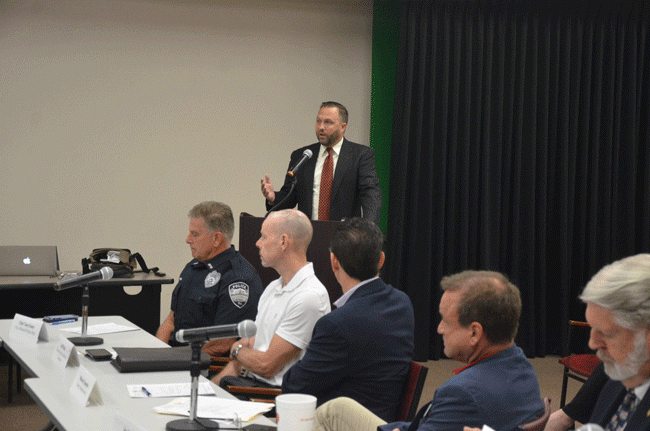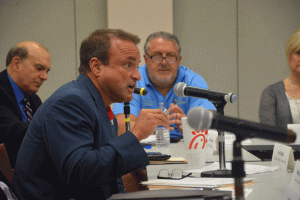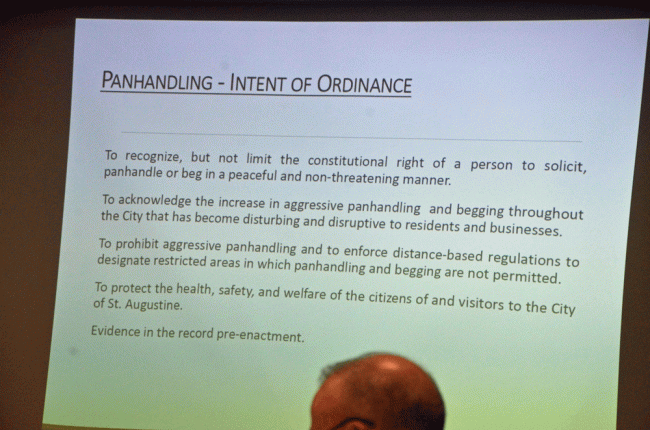Assistant City Attorney John Cary found no takers for our Nation's Oldest City's unjust law in neighboring Flagler County, where it is reported he is applying for a judgeship.
John Cary's first trial trial of a homeless person involved possible subornation of perjury, which Editor Georgio Valentino and I reported in Folio Weekly in a March 20, 2019 cover story, here.
Joe Mullins Steps Back From Harsher Homeless and Panhandling Rules After Hearing St. Augustine’s Rigid Approach
FLAGLERLIVE | AUGUST 14, 2019
“I don’t want to do the panhandling permit now,” he said this morning after the presentation by Cary, an assistant city attorney in St. Augustine (and a candidate for Flagler County judge) who’s been at the forefront of that city’s rather draconian and relatively new panhandling ordinance and related regulations of sleeping outdoors, hygiene and crowd control in certain tourist areas.
“Some of them we do need, like the public urination,” Mullins said, “some of the things he talked about I think are very good for us to look at applying. A lot of them aren’t going to have any impact because we don’t have the panhandling issues they’ve got. So I don’t think the panhandling is something we’ve got to be as aggressive on. But I do think we have to be on public urination, public drunkenness, maybe have some boundaries around businesses and schools. I like some of that stuff that I heard. Maybe some ordinances on the camping. But that’s got to be evolved. Again, none of that needs to take place until we have something that we can offer them with true help.”
That help would depend on a partnership with a shelter in Volusia, since Flagler doesn’t have the facilities or organizations to provide the help, he said.
St. Augustine enacted its panhandling ordinance in April 2018. It bans panhandling after dark, bans it within 20 feet of businesses, ATMs, public parking lots, parking meters, public restrooms and transportation stops or hubs, and within 100 feet of schools and daycares. Bunnell and Daytona Beach followed, with slight variations. Bunnell’s ordinance is strictly citation-based, whereas in St. Augustine a panhandler can eventually be arrested, though by last February citations, usually carrying $100 fine that can be worked off through community service, outnumbered arrests by a three-to-one margin.
No ordinance may target the homeless directly. But indirectly, shrewd ordinances have room to maneuver.
“For whatever reason our panhandling ordinance has gotten national attention,” Cary said, “and we get calls it seems like every week from different jurisdictions, from their city attorneys, their county attorneys, their county policy makers, asking about our ordinance. I’m not sure exactly why or how it’s become national news and become nationally noticed, but it is something that we’ve been dealing with because it’s an emerging issue, panhandling, because of some recent court cases.”
One of the calls was from County Attorney Al Hadeed, who had been discussing Flagler’s pioneering short-term rental ordinance with Cary (St. Augustine is preparing its own ordinance). He invited Cary to address the coordinating council in the context of Mullins’s interests in the subject–and St. Augustine’s fresh, on-the-ground experience at the intersection of law, law enforcement and the rights of 260 homeless individuals counted there (196 men, 160 women).
For the most part, Cary said, the homeless are a peaceful population, their issues with the law limited to nuisance matters rather than serious crime–drinking, urinating, trespassing, “not what you’d consider violent offenses.” On rare occasions, more serious crime occurs, as when Jeremy Davis, 40, allegedly punched and kicked his former campsite mate after a dispute, killing him.
“You can’t say that it’s just solely an insular population that doesn’t affect the rest of the city and the rest of the community,” Cary said, nevertheless without citing evidence that such violent crimes among the homeless are more elevated than the rate in the general population: in that sense, the homeless population is no more or no less “insular” than the regular population, where murders and violent crime occur, but aren’t singled out as indicative of a crisis as homeless crimes often–and misleadingly–are. For example, a 2002 Department of Justice-funded study found that while the homeless are arrested more often, it was usually for nuisance issues, and they were charged with violent crimes proportionately less often than “housed” persons. A more recent study found that the harsher the ordinances, the likelier the increase in the severity of homeless crimes, while a pair of 2018 studies showed no link between homeless encampments and crime.
One of the gentlemen who was in front of the court all the time–you get to know certain people by name in the court system,” Cary said, “looked me in the eye one day during arraignment and asked me, ‘Please help me, will I get treatment.’ So I worked with one of our outreach officers to get this man treatment, and we sent him up to Jacksonville for alcohol treatment program. The judge as part of the deal sentenced him but offered day-for-day commutation of the sentence for every day that he was in the program. So the treatment program was an alternative to the jail sentence that he was going to get. The result of that unfortunately was that he left the program after one day.”
He was arrested and returned to jail. “Even people that I think sincerely want help sometimes don’t have the internal fortitude, the internal drive to actually get help once it’s offered. There is no easy solutions to the problem,” the attorney said.
He then went through a series of ordinances on the books in St. Augustine–public drinking, sleeping in public, panhandling, public performances, and so on. The common thread Cary stressed was that while each ordinance carries penalties to violators, it remains the city’s burden, at every turn, to ensure that individuals have an alternative: individuals can’t be arrested for public urination if the city doesn’t provide a free public restroom, open 24 hours. Individuals can’t be arrested for sleeping on a public bench if the city doesn’t offer shelter alternatives. The city contracts for 8 beds a night, all year round, at a shelter, to ensure that when an individual is caught sleeping in a public space, officers can first direct the individual to the shelter, taking out the handcuff only if the person doesn’t comply. The cost to the city: $100,000. The shelter must be non-sectarian, otherwise the city could face a lawsuit from an individual who may feel his or her First Amendment rights have been violated.
The ordinance against public drinking, for example, affected local breweries, because it banned people from walking out of breweries with growlers, because those are opened, unsealed containers. “We’ve been told this just last week that they will not fill up growlers because the person is immediately subject to citation and or arrest if they take it out on the public street when they leave,” Cary said. “So all of these ordinances that we have, you have to consider that they’re going to have downsides to the local businesses, to the local residents, because they have to be enforced evenly. You can’t allow somebody to walk by with a growler on one hand, and then arrest the homeless guy with a bottle of vodka in a bag on the other.”
As for St. Augustine’s own, much-debated panhandling ordinance, “it hasn’t been upheld,” Cary said, “because it’s still relatively new, but I can tell you for sure, the ACLU has looked at it and we haven’t had anybody come in and defend any of the homeless people that we’ve prosecuted, and we’ve prosecuted dozens and dozens, maybe upward of 100 prosecutions under this ordinance since it was enacted last year. Not once has there been a constitutional challenge to it. I hope that’s because they looked at it and said yes, this complies with the constitution. So I think that may be one of the reasons people are modeling theirs after ours.”
Still, he stressed, “you can’t legislate homelessness completely. You can try to legislate some of the negative effects of it, but you’re even limited there. You can’t completely have an ordinance that bans panhandling at all. That’s clear at this point. You have to allow people to sleep in public if you don’t provide them some other alternatives. You can make a difference as policy makers, but you can’t legislate the problem away completely.”
Members of the Public Safety Coordinating Council had few questions: they’ve been generally cool–tolerant, but not enthusiastic–toward Mullins’s urging to develop any type of additional ordinances. There’s no interest in such ordinances in palm Coast, none from Sheriff Rick Staly, and combining those two forces, any county effort would appear doomed. Public Defender Jim Purdy asked about the trek of a defendant after arrest, through the court system. Many sit in jail for a week, waiting for arraignment: that ends up being their penalty, as most are then released. Others may get 60 days in jail. Only a few ask for the right to counsel.
No case has gone beyond the pre-trial stage. Most plead just to get out of jail. “The homeless community, they contact each other, we don’t want word getting around that if they start pleading not guilty, asking for an attorney, that the city is just going to drop their case,” Cary said. “Our interest is once we get to that point we want to go all the way with it. I have had trials before, jury trials, because people wanted them. It seems kind of on its face unreasonable sometimes to prosecute somebody and waste the court’s time, the clerk’s time, everybody’s time on a minor criminal offense. But part of it is just the incentives you provide. You don’t want to start getting the reputation that you’re going to drop it once it goes beyond a certain stage, because then that word will get out and everybody is going to start to ask to go to trial.”



No comments:
Post a Comment